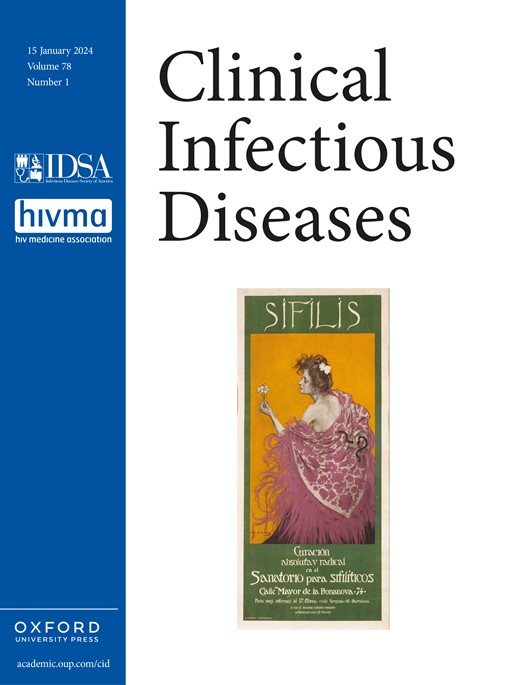不向急性呼吸道和胃肠道感染患儿开具不必要抗生素处方的经济激励措施的长期效果:日本全国性准实验研究
IF 8.2
1区 医学
Q1 IMMUNOLOGY
引用次数: 0
摘要
背景 为解决抗生素过度使用问题,日本政府于 2018 年实施了一项新颖的财政激励政策。该政策使符合条件的医疗机构能够为每例不开抗生素处方的病例索赔 800 日元(约合 5.7 美元),这些病例是年龄在 3 岁以上、患有急性上呼吸道感染或肠胃炎的儿童。虽然在我们之前的研究中观察到了这一政策的短期效果,但尚未在全国范围内对其长期效果进行评估。方法 我们采用交错差分设计和倾向得分匹配法进行了一项准实验研究。我们从两个全国性的行政数据库中提取了 2017 年 4 月至 2019 年 3 月间出生的 165 113 名儿童的数据。该研究对这些儿童进行了跟踪,直至 2022 年 5 月,并对那些接触了该政策的儿童与那些没有接触该政策的儿童进行了比较。结果 采用经济激励措施后,抗生素处方总量在第一个月内减少了 44.9%(95%CI,41.1% 至 47.7%),在 48 个月内减少了 19.5%(95%CI,8.7% 至 29.1%)。同期,广谱抗生素的使用也减少了 24.4%(95%CI,14.0% 至 33.6%)。该政策并未导致住院、下班后就诊或医疗费用的增加,但与就诊次数的轻微增加有关。观察到了剂量-反应关系,抗生素使用量的减少在大约五次激励后趋于平稳。结论 经济激励措施有效减少了儿童的抗生素处方用量,且不会对健康造成不良影响,并在四年内持续产生效益。这种抗菌药物管理干预措施为其他国家遏制抗生素过度使用和抗菌药物耐药性提供了一种可推广的模式。本文章由计算机程序翻译,如有差异,请以英文原文为准。
Long-term Effectiveness of Financial Incentives for Not Prescribing Unnecessary Antibiotics to Children with Acute Respiratory and Gastrointestinal Infections: A Japan’s Nationwide Quasi-Experimental Study
Background To address antibiotic overuse, the Japanese government implemented a novel financial incentive policy in 2018. The policy enables eligible healthcare facilities to claim 800 JPY (≈5.7 USD) per case wherein a rationale to not prescribe antibiotics is offered to children aged <3 years with acute upper respiratory tract infections or gastroenteritis. Although the short-term effect of this policy was observed in our previous study, its long-term effects have not been evaluated nationwide. Methods We conducted a quasi-experimental study using a staggered difference-in-differences design with propensity score matching. Data from 165,113 children born between April 2017 and March 2019 were extracted from two nationwide administrative databases. The study tracked these children until May 2022, comparing those exposed to the policy with those who were not. Results The introduction of financial incentives led to a 44.9% reduction (95%CI, 41.1% to 47.7%) in total antibiotic prescriptions within the first month and 19.5% reduction (95%CI, 8.7% to 29.1%) over 48 months. Broad-spectrum antibiotic use also decreased by 24.4% (95%CI, 14.0% to 33.6%) over the same period. The policy did not result in increased hospitalizations, after-hours visits, or healthcare costs, but was associated with a slight increase in the number of office visits. A dose-response relationship was observed, with reductions in antibiotic use leveling off after approximately five incentives. Conclusions Financial incentives effectively reduced antibiotic prescriptions in children without adverse health outcomes, demonstrating sustained benefits over four years. This antimicrobial stewardship intervention offers a scalable model for other countries aiming to curb antibiotic overuse and combat antimicrobial resistance.
求助全文
通过发布文献求助,成功后即可免费获取论文全文。
去求助
来源期刊

Clinical Infectious Diseases
医学-传染病学
CiteScore
25.00
自引率
2.50%
发文量
900
审稿时长
3 months
期刊介绍:
Clinical Infectious Diseases (CID) is dedicated to publishing original research, reviews, guidelines, and perspectives with the potential to reshape clinical practice, providing clinicians with valuable insights for patient care. CID comprehensively addresses the clinical presentation, diagnosis, treatment, and prevention of a wide spectrum of infectious diseases. The journal places a high priority on the assessment of current and innovative treatments, microbiology, immunology, and policies, ensuring relevance to patient care in its commitment to advancing the field of infectious diseases.
 求助内容:
求助内容: 应助结果提醒方式:
应助结果提醒方式:


